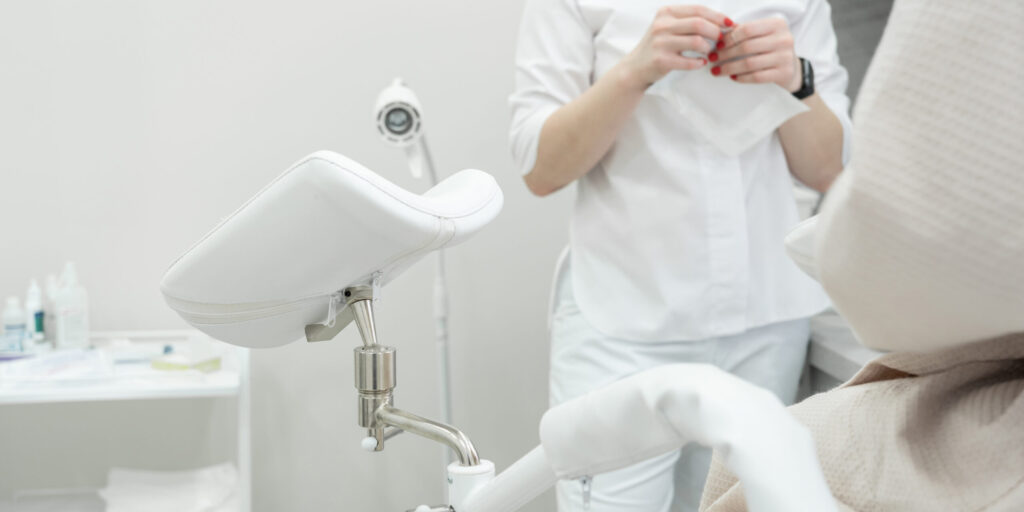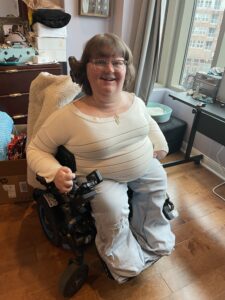
Women With Disabilities Need Gynecologists, Too
By Margaret Wahl, Updated by Joanna Buoniconti | Tuesday, May 9, 2023
The American College of Obstetricians and Gynecologists (ACOG) recommends that women visit an obstetrician-gynecologist (OB/GYN) once a year for a well-woman visit starting at age 21, and this includes women with neuromuscular diseases and other disabilities. Yet the difficulty of finding accessible OB/GYN care causes many women with mobility limitations to avoid it.

Katrina Kelly found a supportive gynecologist who worked with her mobility limitations.
Katrina Kelly, an Indianapolis attorney who lives with spinal muscular atrophy (SMA) and uses a power wheelchair, is used to taking charge of all things related to her health. But she found her experiences with pelvic exams daunting, to say the least.
Just getting on the exam table for her first pelvic exam was a hurdle.
“They brought in a lift and had two guys operating the lift,” Katrina recalls. “They didn’t see me naked, but it was awkward. They put a sling under me, and it took 10 or so minutes to get me onto the table. Then I had to explain that I couldn’t use the stirrups and that I had to have someone hold my legs. My mom and a nurse held my legs, and they did the exam.”
While ACOG no longer recommends annual pelvic exams, these exams are important when a woman has abnormal bleeding, pelvic pain, or other symptoms of gynecological problems. And ACOG and other experts still recommend Pap smears (an analysis of cells from the cervix, obtained during a pelvic exam) at least every three years to screen for cervical cancer.
Katrina, 37, has only had two pap smears in her life.
“The first one was a bit awkward,” Katrina says. “We had multiple nurses trying to help hold my legs as well as my PCA [personal care attendant]. I was terrified since I hadn’t had one before, but it wasn’t too bad. A few years later, I did another Pap smear, and we actually managed to do it in my wheelchair. I wore pants that were easy to take off and leaned my chair way back. They were able to hold my legs up in the chair, and the doctor successfully performed a Pap smear. I had a very supportive gynecologist help me with these two appointments. She’s a nurse practitioner, and I felt like she really took the time to make me comfortable.”
Women’s health and aging
Carol Abraham, 62, is a retired occupational therapist living in Twin Lakes, Wisconsin. She has limb-girdle muscular dystrophy (LGMD) and uses a power wheelchair.
Carol, who is menopausal, has noticed changes in her body and has sought and received medical attention for them, but she has had to be assertive about getting it.

Carol Abraham requests an exam room with a low table and extra time when she makes an appointment.
“Very few clinics have an exam table that is low enough for me to transfer from a wheelchair,” Carol says. “I frequently have to request their special procedure room, and the examination is more of a challenge than it would normally be. I know that when I call to schedule something, I need to inform them that I’m in a power wheelchair, need to be sure that I am in a room with a lower exam table, and that my husband will be coming to help me.”
If her husband isn’t available, she requests extra assistance from the staff and, when possible, a mechanical lift. “You can bring your own lift and/or sling,” Carol says, “but it’s a huge hassle.” (Portable lifts may be a solution for some women.) She has found that larger academic healthcare facilities — instead of smaller local clinics — are more likely to have lifts available and are more comfortable accommodating her physical needs.
Mammograms, she says, have not been a problem. “As long as I can position myself close enough to the machine and as long as the arms flip back on my chair (if necessary), all I need is someone to help lift my arms for positioning,” Carol says. “But the positioning takes extra time, so I request a double time slot for my mammograms.”
Carol’s MDA Care Center referred her to the Women’s Incontinence and Sexual Health (WISH) clinic at Froedtert Memorial Lutheran Hospital in Milwaukee, where she underwent testing and treatment for hormonal changes, has learned to do some exercises to help with bladder function, and has even felt free to ask intimacy-related questions.
“I know it’s something that is not approached often,” Carol says, “but sexuality and intimacy are important aspects of a healthy life, regardless of a disability.”
Changing attitudes
Katrina believes there is still a widespread assumption that women with neuromuscular disorders are not sexual or even that they shouldn’t be sexual.
“I think it’s just a damaging viewpoint throughout our culture, and it has permeated the medical field and everywhere else,” she says. “It’s very damaging to a woman’s self-esteem. I’ve even heard horror stories about women being criticized for taking the risk of having sex and possibly getting pregnant.”
Today, more women with neuromuscular diseases, including SMA, are giving birth, but there are still healthcare providers who caution against it. “I personally had a doctor warn me that I should not get pregnant, and I let him know of my many friends who have had positive experiences,” Katrina says. “Many doctors are still not asking women in wheelchairs enough about their sexual health. It is simply glossed over.”
According to ACOG, an annual well-woman visit can include talking with your doctor about sex, birth control, planning for pregnancy, and other concerns. For a woman with a neuromuscular disease, this visit also offers an opportunity to learn about her doctor’s attitudes toward sexual health and pregnancy and make sure they align with her own.
Getting accessible healthcare
Women with neuromuscular disorders have the same needs for routine screenings, contraception, and pregnancy-related care as any other woman, and they also may have additional needs.
A study suggests that women with type 1 myotonic muscular dystrophy (MMD1 or DM1) may be at increased risk for gynecologic cancers. Women with neuromuscular disorders have a higher-than-average rate of complications related to pregnancy and childbirth, but women with DM1 are particularly vulnerable to these issues.
In addition, weak pelvic muscles can cause the bladder, uterus, or rectum to slip downward, causing pain, constipation and urinary urgency, and weak abdominal muscles can make defecation difficult.
Women who are mostly immobile have a higher-than-average risk of blood clots — something that physicians need to consider when selecting an oral contraceptive medication.
“Every woman should have appropriate care of their urogynecology needs,” says Ericka Greene, MD, Director of the MDA Care Center at Houston Methodist. “The neurologist or the primary care physician should direct the patient to providers in the field who have experience with women with neuromuscular disorders. I have identified obstetricians and/or gynecologists who are experienced in taking care of patients with neuromuscular diseases to whom I refer my patients. From issues related to menstruation and pregnancy to the challenges associated with the gynecologic exam and mammogram, seeking such care can be an overwhelming and often vulnerable experience for our female patients who are at risk for missing critical preventive screenings and treatments.”

Ericka Greene, MD, has seen an increase in specialists willing to accommodate patients with disabilities.
However, she recognizes why many women are reluctant. “Gynecologic exams and mammograms are a vulnerable experience, and a lot of our patients choose not to have them done,” she says. “With greater education and awareness of patient needs with the focus on improving access, there are an increasing number of specialists who have invested in the changes necessary to serve our patients. However, there is still significant room for improvement across practice settings and geographical locations.”
The Americans with Disabilities Act (ADA) prohibits discrimination against individuals with disabilities in everyday activities, including medical services. The ADA’s guidelines state that all medical care providers must make their services available in an accessible manner. In fact, the Access to Medical Care for Individuals with Mobility Disabilities page on the ADA website specifies that “examinations which require specialized positioning, such as gynecological examinations, must be accessible to a person with a disability. To provide an accessible gynecological exam to women with paralysis or other conditions that make it difficult or impossible for them to move or support their legs, the provider may need an accessible height exam table with adjustable, padded leg supports, instead of typical stirrups.”
The webpage also describes the different tools (i.e., transfer board or mechanical lift) that medical offices should be able to provide for individuals who cannot independently get on the exam table. But the unfortunate reality is that not every office abides by these standards.
| CHALLENGES | SOLUTIONS |
| Physical Barriers
Getting into the correct position for a gynecologic exam can be difficult. |
Explain your needs when you make an appointment and ask if accessible equipment is available, request extra time for the visit, and bring a portable lift and/or a friend or relative to assist you. |
| Attitudinal Barriers
Some professionals may not think about gynecologic care for women with disabilities or think sex is inadvisable. |
Be assertive about your needs. Consider changing providers if your needs are not met. |
| Financial Barriers
An insurance plan may balk at paying for an out-of-network gynecologic care provider, even that’s the best option for a woman with a disability. |
Ask your primary care provider or neurologist to write a letter explaining why you need a referral to an out-of-network provider. Share contact information for the insurance company or government agency with your provider. |
Be your own advocate
Carol emphasizes that women need to be assertive about their healthcare.
“You need to be your own advocate,” she says, whether it’s getting extra help with positioning for a pelvic exam or mammogram or asking for advice about intimacy.
She’s especially concerned about women who say they’re avoiding routine screenings because of physical or psychological discomfort. “Yes, it’s more of a challenge for the examination,” Carol says. “But when you look at the benefits of preventive measures, I would much rather go through that discomfort than face the challenges that I would have to deal with if I developed cancer. When put in that perspective, it’s a very small price to pay for the prevention you are seeking.”
Next Steps and Useful Resources
- Read How to Speak Up for Your Healthcare Needs in Hospitals and Doctors’ Offices
- To find healthcare resources and support, contact the MDA Resource Center at 833-ASK-MDA1 or ResourceCenter@mdausa.org.
- Stay up-to-date on Quest content! Subscribe to Quest Magazine and Newsletter.
Disclaimer: No content on this site should ever be used as a substitute for direct medical advice from your doctor or other qualified clinician.




